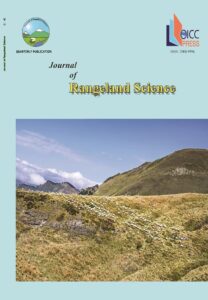Chemical Composition and In Vitro Digestibility of Some Range Species in Rangelands of Chaharmahal and Bakhtiari Province, Iran
Authors
Abstract
Five common range forage including Agropyron intermedium, Bromus
tomentellus, Hordeum bulbosum, Cousinia bakhtiarica and Scariolla orientalis, were
sampled during three phenological stages, from controlled rangeland stations over five
locations in Chaharmahal and Bakhtiari province, Iran. All samples were chemically
analyzed for Crude Protein (CP%), in vitro Dry Matter Digestibility (DMD), Organic
Mater Digestibility (OMD), Ether Extract (EE), Crude Fiber (CF), total Ash, Neutral
Detergent Fiber (NDF) and Acid Dtergent Fiber (ADF). Results for Crude Protein (CP%)
showed significant differences between phenological stages in all of species. Maximum CP
(15.2%) was found in vegetation stage of Hordeum bulbosum and the minimum (2.9%)
was in seed ripening stage. The CF% was significantly different between phenological
stages as well as the species. The minimum and maximum values of CF% were found in
Agropyron intermedium in Coosinia bakhtiarica, respectively. Similarly, the minimum
values of NDF and ADF were found in vegetative stage of Scariolla orientalis and
Agropyron intermedium respectively, but the maximum values were obtained in seed
ripening stage of Hordeum bulbosum and Cousinia bakhtiarica. The DMD and OMD%
showed slightly reduction passing from vegetation to seed ripening stage in most of the
species. The highest DMD and OMD% had been observed in vegetation stage of Scariolla
orientalis and the lowest were in Bromus tomentellus. It can be concluded that in the early
stage of growth, the quality of forage in range species is adequate for livestock
production but during that stage, the greatest problem is its lower quantity. By progress of
the vegetation stage toward the seed ripening stage, the nutritive value of all species
decreased thus grazing animals oppose to nutrient deficiencies.


